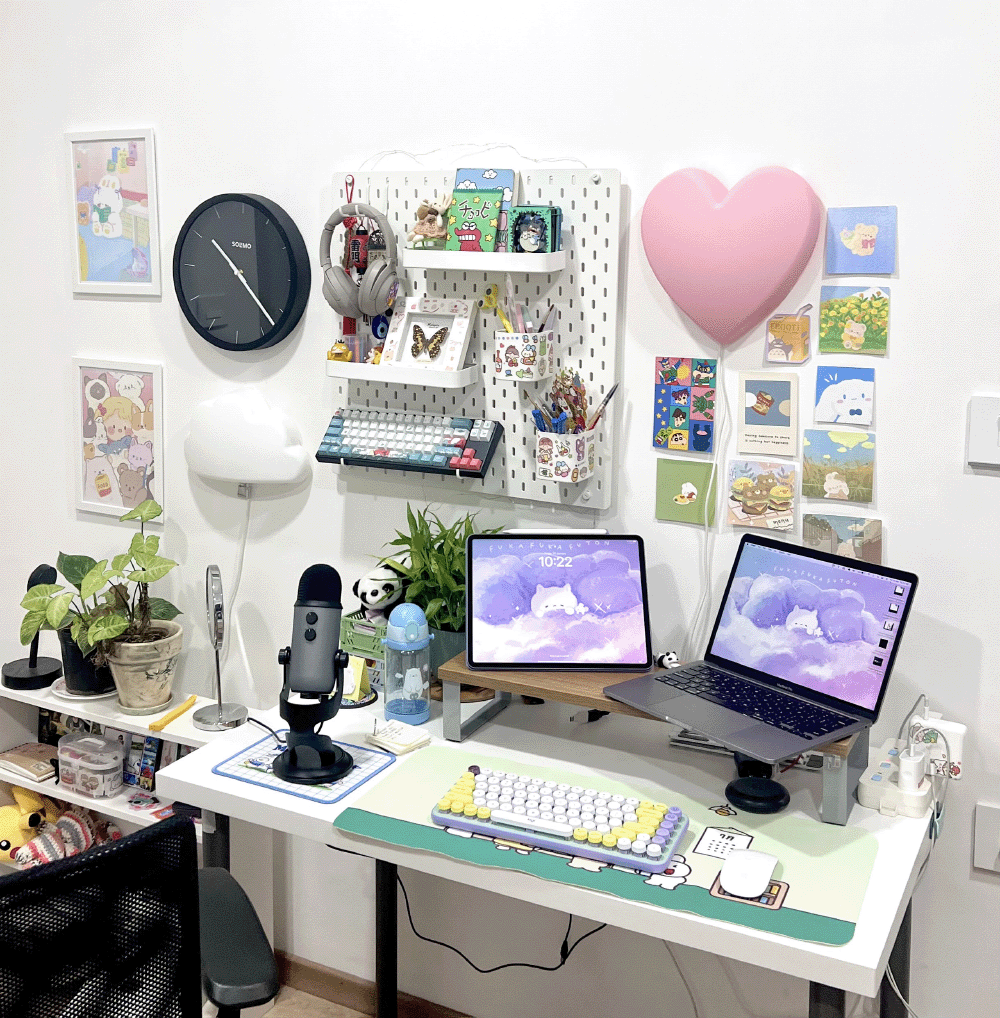People often ask me how I plan my trips? In this post, I have distilled down my knowledge into a 10 step guide for beginners.
If you're planning your first international trip, I hope this guide helps you get started and feel prepared for your upcoming adventure!
Travel Requirements
The very first step of the entire process is to pick a destination. Once that's decided, it's time to start the paperwork!
I wish traveling to a new country was as easy as just boarding a flight and reaching the destination. It might be look like that for some people, but unfortunately for others, visas are a painful reality.
Here's a list of things to know about before you even book a flight ticket:
- If you require a visa and what type of visa is applicable for your situation. If you can get a visa on arrival, or if an e-visa facility is available to you or if you need to visit the embassy or a travel agent like VFS.
- What are the documents required for the visa?
- Time taken for the visa to process.
- Are there any covid restrictions? Do you need to be double vaccinated or triple vaccinated? Do you need to provide a negative covid report? Do you need a travel insurance?
A nice hack to check the current scenario of the visa process is to do a YouTube search and filter the results by last month to check if there are no backlogs at the moment or if the visas are not taking longer than usual etc. You'll probably find videos by travel agents that explain the visa process in great detail and what are the common mistakes that people usually make. This is important because you don't want to plan everything only to know that your visa was rejected at the end because of a stupid mistake.
Most of the time, the visa application requires you to present a round trip flight ticket. Make sure to look out for refundable flight options and compare flight prices using apps such as Skyscanner.
Research Phase
YouTube is the perfect place to start your research process. If you're nervous about the trip, it will help ease you out and make you feel comfortable with the idea of traveling and give you an idea of what to expect.
There you can find several people who have already documented their own adventures and also give you tips and tricks to make the most out of your vacation as well as provide some common dos and donts.
Pinterest is also a good place to find blogs if you prefer reading more than watching and an added bonus is you get to know about cool photo spots as well!
The aim of this step is to figure out the places that you'd like to visit and shortlist them depending on the number of days you'll be there. Personally, I am a huge Notion fan and use it to pretty much manage every aspect of my life.
Here's the planning I did for Thailand:
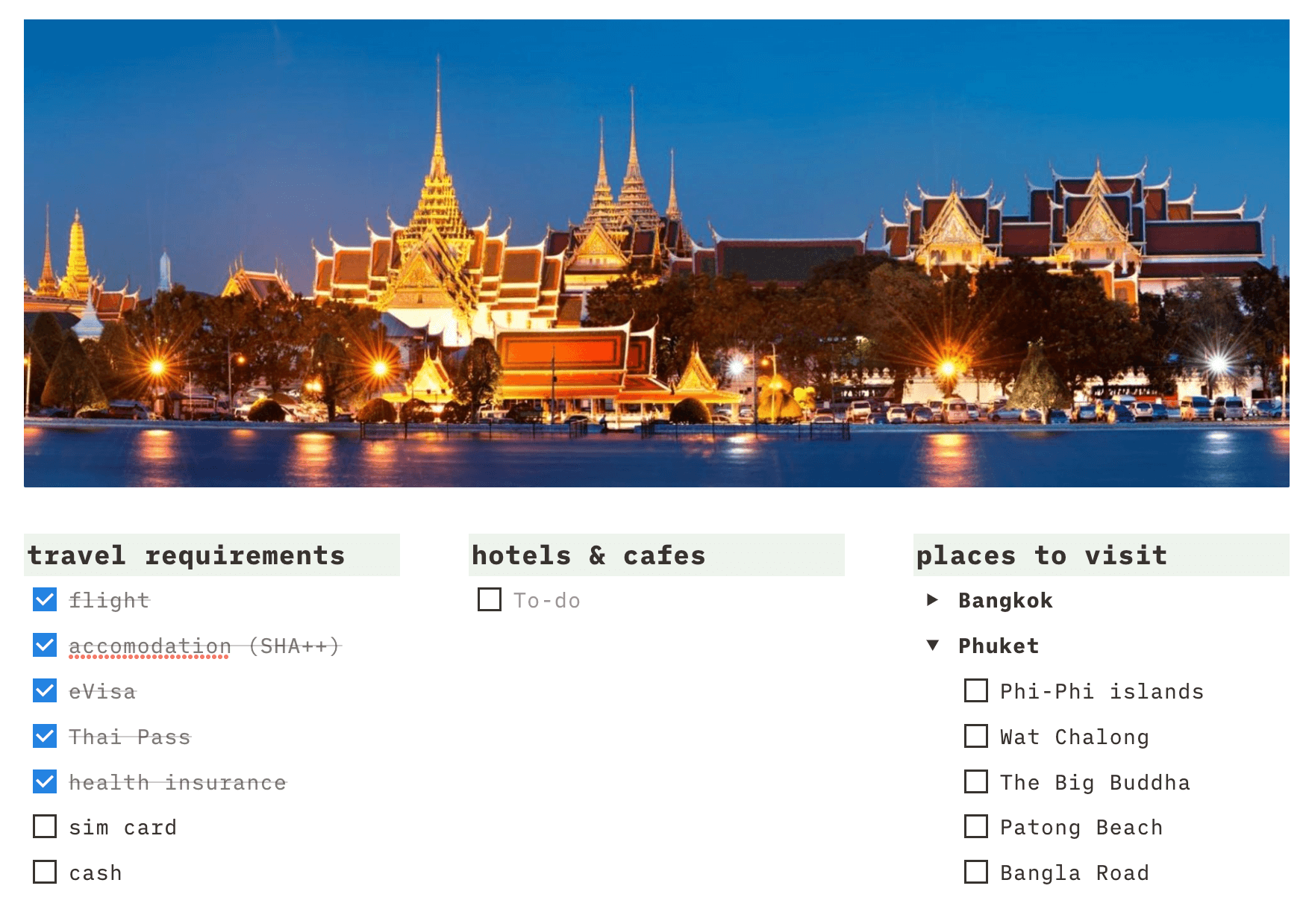
Additionally, you can also add pictures of these places so that you don't have to google search them every time you look at the list.
Plan an Itinerary
Once you have the places finalised, it's time to create an itinerary. Decide how many days you'd like to spend at each places and the order in which you'll be visiting them.
I usually start and end at the same city, the largest city in the country and plan my route using Google Maps as my guide.
I divide my total holiday days among the places and depending on the things to do in each. Here's an example itinerary for 23 days in Japan:
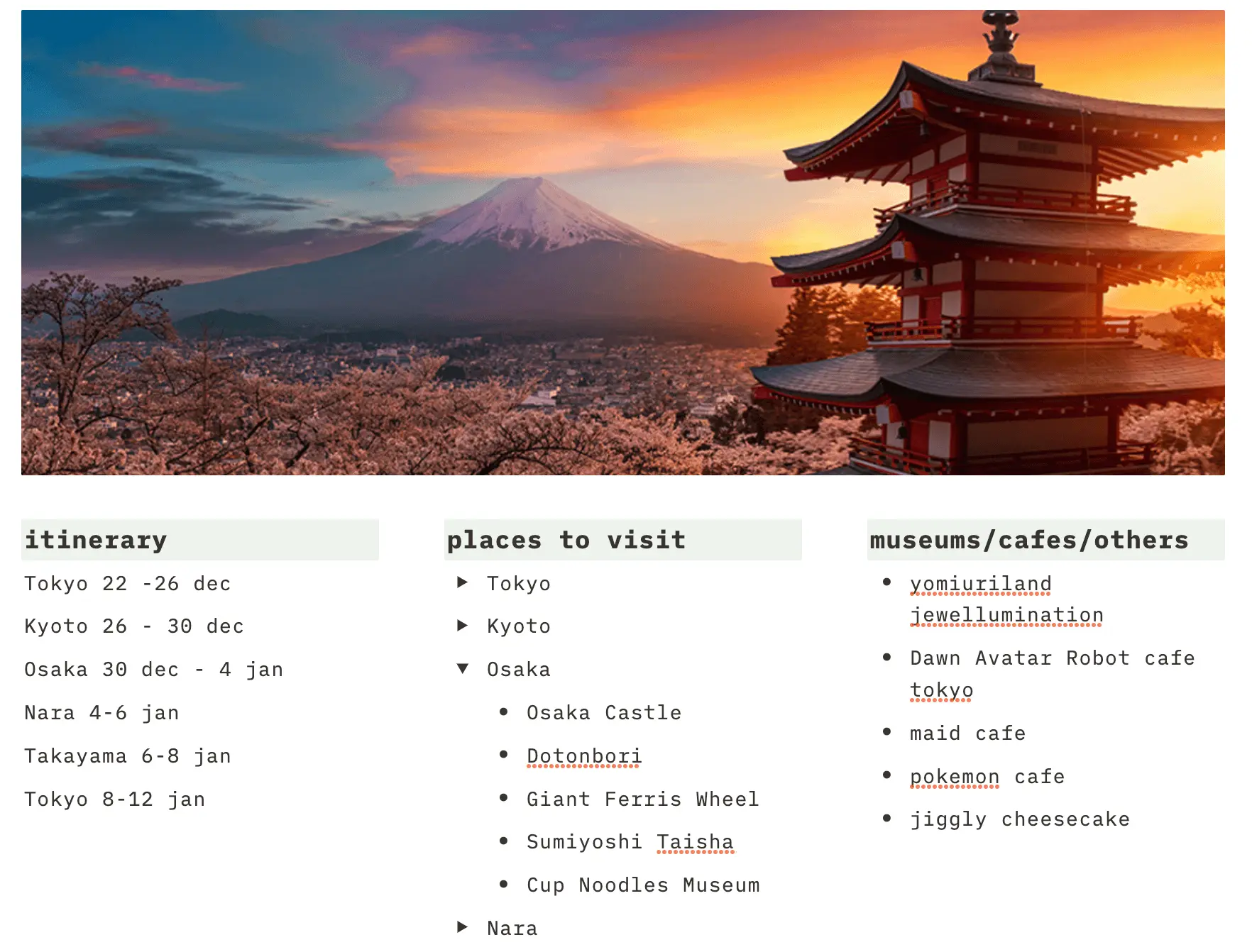
An important thing to look out for is public holidays as some places might be closed at that time or the buses/trains service might be reduced.
Modes of Transportation
Now that you have the itinerary, it's time to book flights/trains/buses to jump from one place to the other.
Rome2rio is a wonderful website that helps you find how to travel from one place to another. It helps you compare different travel options on the basis of time and money.
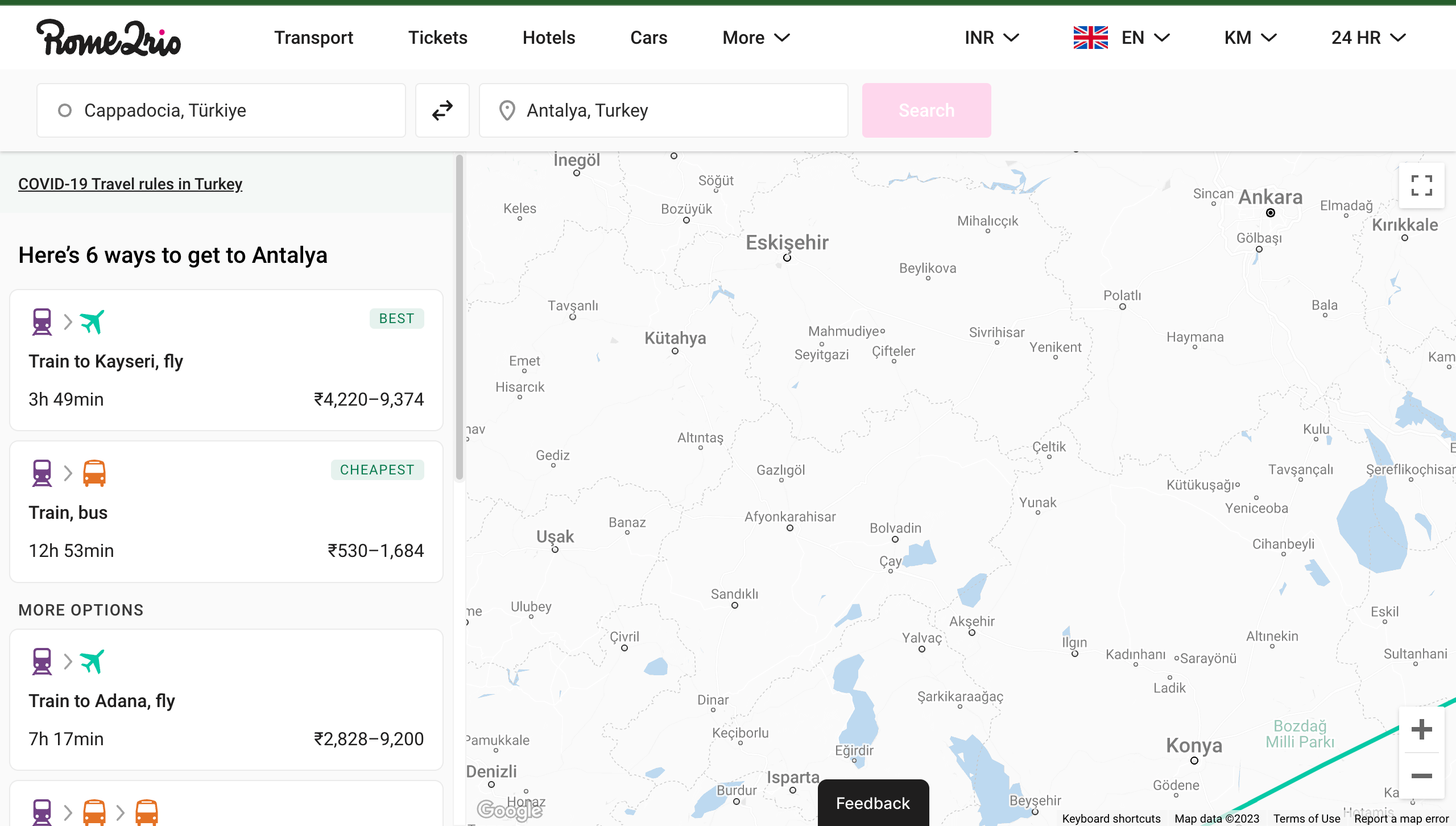
If you're still confused, a quick YouTube search will also do the trick!
Check if there's a bus pass/train pass available for tourists and if that will be more economical for your stay there. Another thing to search for is whether online taxi booking apps such as Uber, Grab etc are available.
Accommodation & Reservations
Once your itinerary is planned, it's time to book accommodation. I usually use Booking.com or Agoda. Though I've had a bad experience with Agoda in the past where the booking we did was invalid as the hotel didn't exist (it was renamed and had a new owner) and we only realised it after reaching the hotel itself and the resolution that Agoda provided was less than ideal. But sometimes you might not have any choice as Booking.com might not have as many options as Agoda, specifically in East Asian countries. As a lesson, I've learned to always have a confirmation with the hotel, separate from the app, using the email provided.
Here are some things to look out for while booking an accommodation:
- if you're applying for a visa, look for refundable bookings to minimise your losses (just in case).
- Prefer booking accommodations that are nearby subway/metro stations.
- Check the nearby landmarks and attractions and make sure the hotel is not too far off from the places you've planned to visit.
- You can also do a google search about the best areas to stay as a tourist.
- You can also use Google's My Maps that helps you figure out the best area to stay in according to the places you'd want to visit.
If you want to visit any special restaurant, make sure to reserve in advance. Same goes for theme parks/museums/observation decks and other attractions. You don't need to book everything in advance but some places could be very popular or always booked so plan accordingly.
Common Tourist Traps
Always research about the common tourist traps in the city before traveling. Nobody likes being taken advantage of in a foreign land.
For example, in Thailand, the Tuk Tuk drivers would lie to you about the Grand Palace being closed that day and offer to take you to another attraction that's open and ask a crazy amount of money for that ride. Or in Istanbul, where someone would pretend to drop a brush and once you hand it to them, they'll start polishing your shoe as a thank you only to ask money for the job at the end.
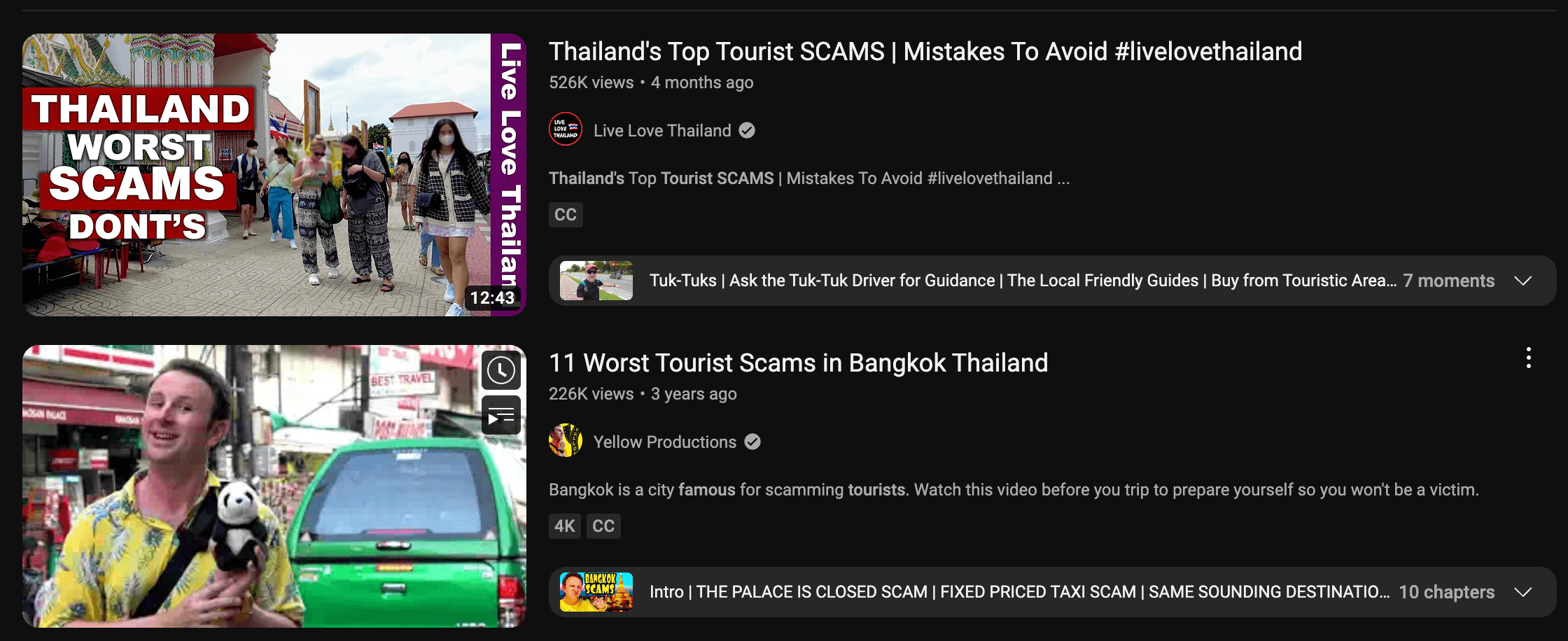
It's always better to be on alert mode and to be over-prepared especially while traveling alone.
Cash
Thanks to technology, there are many different payment options available to us today: cash, cards, online payment apps, cryptocurrency etc. It's advised to research about the most commonly used payment methods and plan accordingly. Always carry a couple different options to be safe and at least a little bit of cash. You can get currency converted in your hometown. Compare the exchange rate of different agencies and choose accordingly.
If you choose to pick up cash after reaching the destination, make sure to research about the local banks in that area that provide no or a lower ATM fee for card transaction. As a safety precaution, do not keep all your cash in the same place. In case you lose your wallet or bag, you don't want to end up losing all your money as well.
Packing
Get an idea about the weather conditions during the time that you'll be visiting and pack accordingly. A nice hack that I use is to search for walking tour videos of a particular month of the city that I'm headed to and check out the clothes that people are wearing. Here's an example of what I'm talking about:
Make sure to pack light and make space for the awesome souvenirs you're going to buy on your trip!
I have created a packing checklist on Notion that I refer to before all my travels! Here's a template that you can duplicate :D
Pre-Departure Checklist
- Different countries use different plug types. Make sure to carry the correct pin type or buy a global adapter.
- Power banks are essential since you might be outside for longer hours. Check if the one you have is allowed as hand baggage by your airline.
- Keep a set of hard copy and soft copy of all your documents. Printouts will also come in handy at the immigration checkpoints.
- Do not forget to keep your passport and a copy of your visa if it's and e-visa.
- Nowadays you can buy tourist e-sims for any country online, even before you arrive at the destination. Airalo is one such app that I personally use.
- A downloaded version of the Google map for the particular town/city you're headed to.
- Instructions for how to reach from airport to the hotel. If you're going to reach late at night, check for the timing of the last train/bus beforehand.
- Do not forget you cash/cards and other important documents.
- Buy travel insurance if you haven't already.
- Make sure to do online check-in if available and select the meal of your preference if you have dietary restrictions.
- Weigh your bags!
- Wear clothes appropriate for weather at your departure city, destination city and in-flight. This means carry jackets, sweaters if required within your checked-in baggage
- Carry your toothbrush and toothpaste for long flights.
- Carry some chewing gum, snacks or candies if you wish.
- Turn on foreign transactions on your cards and set limits.
- Share your google location with a trusted friend/family member.
- Airtags!
Post-Arrival Checklist
- Get a sim card if you don't already have one.
- Enquire about bus/metro passes at the airport.
- Reserve any upcoming train tickets/shows/amusement parks if you haven't already.
- Search for nearby ATMs where you can get a low transaction fee.
- Use apps such as Bumble or Airbnb experiences to meet up with locals.
- Lastly, enjoy your trip! :)



